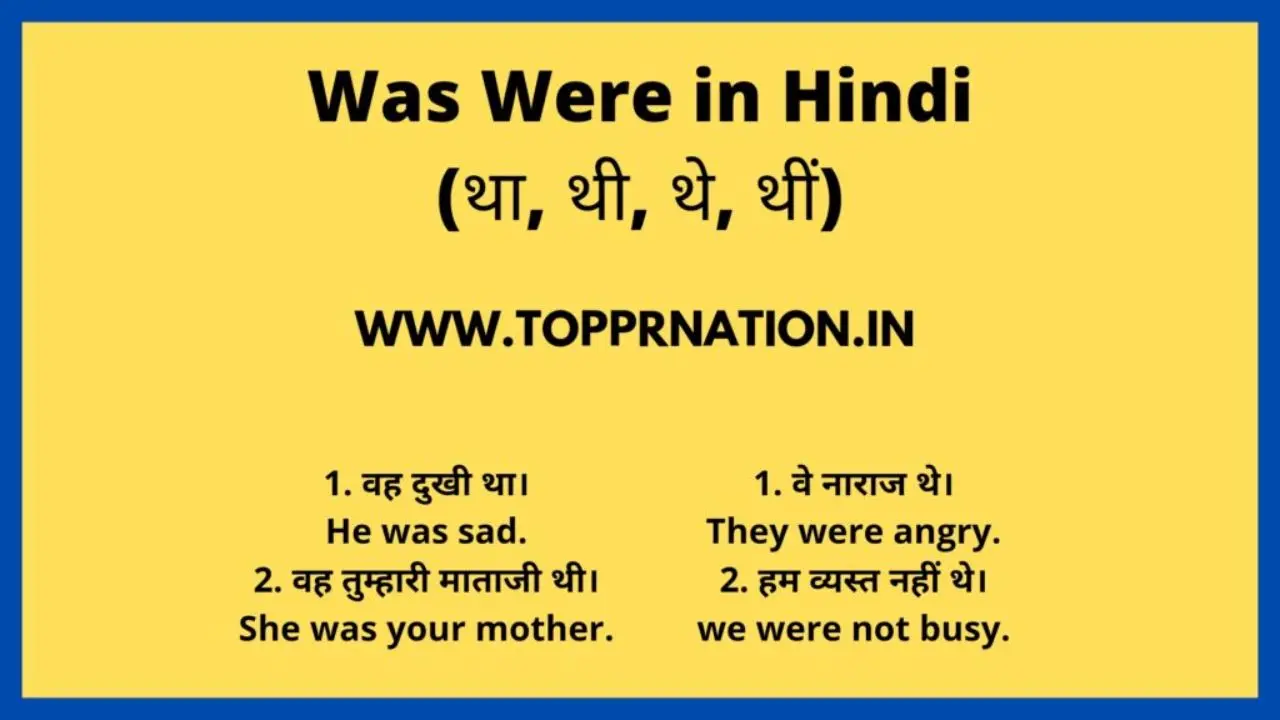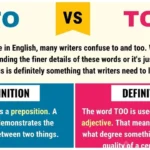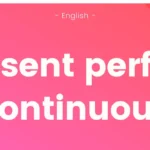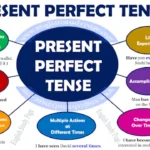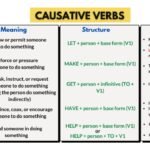Use of Was/Were In Hindi (was/were का हिंदी में सही प्रयोग): जिस हिंदी वाक्य के क्रिया के अंत में “रहा था, रही थी, रहे थे” इत्यादी लगा रहता है और कार्य past form यानी कार्य भुत काल में हो चूका है| को दर्शाता है उसके लिए Was/Were का युस किया जता है| इसमें कोई भी कार्य पहले हो चूका है और जिसकी चर्चा अभी यानी की present में हो रही है, उसके लिए was/wereका उपयोग किया जाता है|
was/were+Noun/Pronoun/Adjective/Adverb
3 Rules And Uses of was/were
Rule 1 : जिस हिंदी वाक्य के अंत में “था, थे, थी ” लगा रहता है उसके लिए was/were का युस किया जता है|
Examples :
- He was a good student. (वह एक अच्छा छात्र था।)
- They were happy. (वे खुश थे।)
- She was intelligent. (वह बुद्धिमान थी।)
- The book was interesting. (किताब रोमांचक थी।)
- It was cold outside. (बाहर सर्दी थी।)
- The children were playing in the garden. (बच्चे बगीचे में खेल रहे थे।)
- The movie was boring. (फिल्म उबाऊ थी।)
- She was at home yesterday. (वह कल घर पर थी।)
- We were late for the meeting. (हम मीटिंग के लिए देर से पहुँचे थे।)
- He was tired after work. (काम के बाद वह थक गया था।)
Rule 2 : जिस हिंदी वाक्य केअंत में “ने जा रहा था, ने जा रही थी, रहे थे” इत्यादी लगा रहता है उसके लिए इस रुल का उपयोग किया जता है|
Examples :
- She was going to be a doctor. (वह डॉक्टर बनने जा रही थी।)
- They were going to be late. (वे देर हो जाने वाले थे।)
- He was going to be happy. (वह खुश होने जा रहा था।)
- She was going to be tired after the journey. (यात्रा के बाद वह थक जाने वाली थी।)
- It was going to be a long day. (यह लंबा दिन होने वाला था।)
- He was going to be successful in his career. (उसके करियर में सफलता होने जा रही थी।)
- The weather was going to be pleasant tomorrow. (कल मौसम सुहावना होने जा रहा था।)
- She was going to be upset about the news. (उस खबर से वह उदास होने जा रही थी।)
- They were going to be excited for the trip. (उन्हें यात्रा के लिए उत्साहित होने जा रहे थे।)
- The event was going to be a grand celebration. (इस आयोजन में भव्य उत्सव होने जा रहा था।)
Rule 3 : जिस हिन्द वाक्य के अंत में “ने वाली थी, ने वाला था ” आदि लगा रहता है तो इस रुल का युस किया जाता है|
एक्साम्प्लेस :
- She was to be the next president. (वह अगली राष्ट्रपति बनने वाली थी।)
- He was to be honored with an award. (उसे पुरस्कार से सम्मानित होने वाला था।)
- The house was to be painted next week. (घर को अगले हफ्ते रंगाया जाने वाला था।)
- The project was to be completed by the end of the month. (प्रोजेक्ट को महीने के अंत तक पूरा किया जाने वाला था।)
- She was to be informed about the decision soon. (उसे जल्द ही निर्णय के बारे में सूचित किया जाने वाला था।)
- The book was to be published next year. (किताब को अगले साल प्रकाशित किया जाने वाला था।)
- They were to be invited to the party. (उन्हें पार्टी में आमंत्रित किया जाने वाला था।)
- The event was to be held indoors due to rain. (इस आयोजन को बारिश के कारण अंदर होने वाला था।)
- The plan was to be discussed in the meeting. (योजना को मीटिंग में चर्चा की जाने वाली थी।)
- She was to be appointed as the new manager. (वह नए प्रबंधक के रूप में नियुक्त होने वाली थी।)
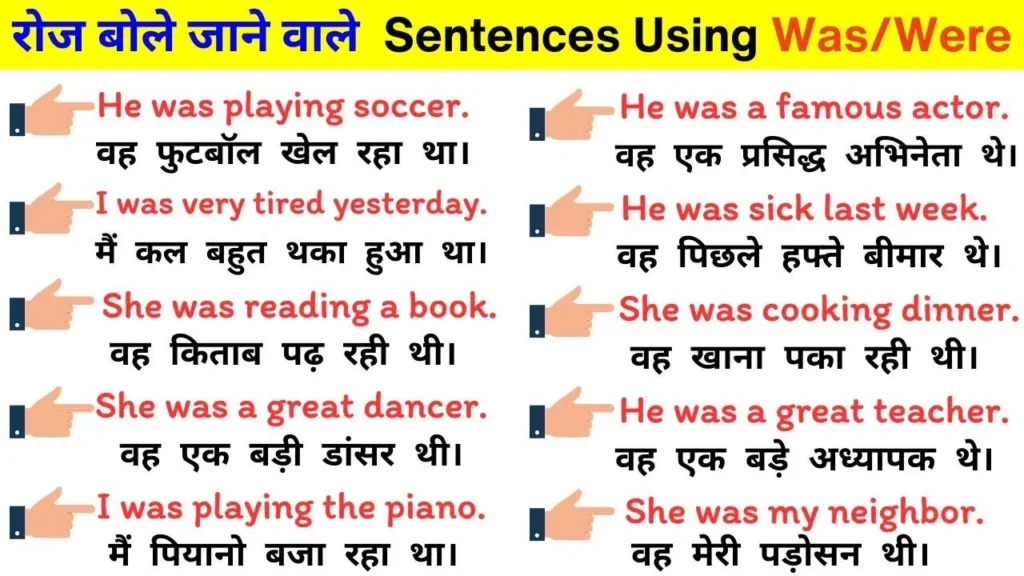
was/were + Infinitive (योजना)
Rule 1 : योजना को दर्शाने के लिए उपयोग किया जता है|
Examples :
- She was to visit her grandmother. (उसे अपनी दादी से मिलने जाना था।)
- He was to submit the report by Friday. (उसे शुक्रवार तक रिपोर्ट सबमिट करनी थी।)
- They were to attend the meeting in the afternoon. (उन्हें दोपहर की मीटिंग में भाग लेना था।)
- The students were to complete their assignments before the exam. (छात्रों को परीक्षा से पहले अपने असाइनमेंट पूरे करने थे।)
- She was to call him back later. (उसे बाद में उसे वापस कॉल करना था।)
- He was to prepare a presentation for the meeting. (उसे मीटिंग के लिए प्रस्तुति तैयार करनी थी।)
- The team was to decide on the project timeline. (टीम को परियोजना की अवधि पर निर्णय करना था।)
- She was to apply for the scholarship. (उसे छात्रवृत्ति के लिए आवेदन करना था।)
- They were to leave early for the trip. (उन्हें यात्रा के लिए जल्दी निकलना था।)
- The guests were to arrive by noon. (मेहमानों को दोपहर तक आ जाना था।)
Rule 2 : नजदीकी योजना के लिए इस फ़ॉर्मूला का उपयोग किया जता है|
Examples :
- He was about to leave for the airport. (उसे हवाई अड्डे के लिए जाने वाला था।)
- She was about to finish her work. (उसे अपने काम को समाप्त करने वाली थी।)
- They were about to announce the winner. (उन्हें विजेता का ऐलान करने वाले थे।)
- The teacher was about to start the class. (शिक्षक को वर्ग शुरू करने वाले थे।)
- He was about to sign the contract. (उसे संविदा पर हस्ताक्षर करने वाला था।)
- She was about to call her friend. (उसे अपने दोस्त को कॉल करने वाली थी।)
- The team was about to win the match. (टीम को मैच जीतने वाली थी।)
- He was about to book the tickets. (उसे टिकट बुक करने वाला था।)
- She was about to announce her resignation. (उसे अपना इस्तीफा देने वाली थी।)
- They were about to complete the construction. (उन्हें निर्माण पूरा करने वाले थे।)
Rule 3 : बेहद नजदीकी योजनाओं को दर्शाने के लिए इस फ़ॉर्मूला का उपयोग होता है|
Examples :
- She was just about to leave the office. (उसे कार्यालय छोड़ने के लिए बस अब जाने वाली थी।)
- He was just about to call you. (उसे बस अब आपको कॉल करने वाला था।)
- They were just about to finish the project. (उन्हें परियोजना समाप्त करने के बस अब थे।)
- The meeting was just about to start. (मीटिंग शुरू होने के बस अब थी।)
- She was just about to solve the problem. (उसे समस्या को हल करने के लिए बस अब थी।)
- He was just about to leave for home. (उसे घर जाने के लिए बस अब था।)
- The car was just about to stop. (गाड़ी रुकने के बस अब थी।)
- They were just about to order dinner. (उन्हें रात का खाना आर्डर करने के बस अब थे।)
- She was just about to finish reading the book. (उसे किताब पढ़ने के बस अब थी।)
- He was just about to start the presentation. (उसे प्रस्तुति शुरू करने के बस अब था।)
Rule 4 : कम नजदीकी योजनाओं के लिए इस Structureका युस किया जाता है|
Examples :
- She was going to call her friend. (उसे अपने दोस्त को कॉल करने जा रही थी।)
- He was going to buy groceries. (वह किराने खरीदने जा रहा था।)
- They were going to attend the wedding. (उन्हें शादी में शामिल होने जा रहे थे।)
- The team was going to practice in the evening. (टीम शाम को प्रैक्टिस करने जा रही थी।)
- She was going to finish her homework. (उसे अपना होमवर्क समाप्त करने जा रही थी।)
- He was going to visit his grandparents. (वह अपने दादा-दादी के पास जाने जा रहा था।)
- They were going to start a new project. (उन्हें एक नई परियोजना शुरू करने जा रहे थे।)
- She was going to cook dinner. (उसे रात का खाना बनाने जा रही थी।)
- He was going to propose to his girlfriend. (वह अपनी गर्लफ्रेंड को प्रपोज करने जा रहा था।)
- They were going to watch a movie together. (वे मिलकर एक फिल्म देखने जा रहे थे।)
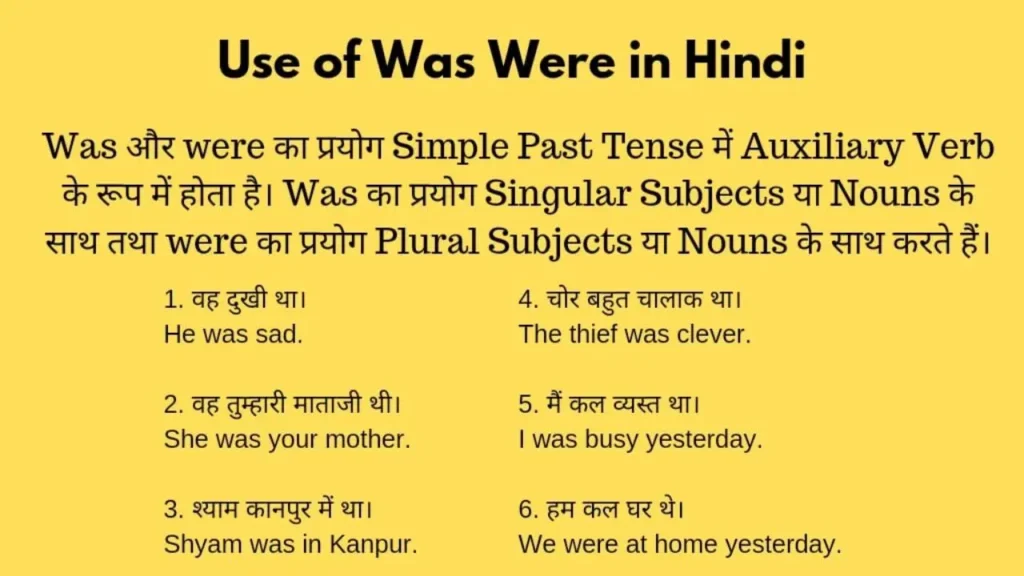
was/were+has/have+Infinitive = योजना
Rule 1 : कर्ज या मज़बूरी को दर्शाने के लिए इस रुल का उपयोग किया जाता है|
Examples :
- She was having to work overtime. (उसे अधिक काम करना पड़ रहा था।)
- He was having to take care of his sick mother. (उसे अपनी बीमार माँ का ध्यान रखना पड़ रहा था।)
- They were having to wait for the bus. (उन्हें बस का इंतजार करना पड़ रहा था।)
- The students were having to study late. (छात्रों को देर रात तक पढ़ना पड़ रहा था।)
- She was having to deal with a difficult client. (उसे एक कठिन ग्राहक से निपटना पड़ रहा था।)
- He was having to repair the car. (उसे कार की मरम्मत करनी पड़ रही थी।)
- They were having to learn a new language. (उन्हें एक नई भाषा सीखनी पड़ रही थी।)
- She was having to manage multiple projects. (उसे कई परियोजनाओं का प्रबंधन करना पड़ रहा था।)
- He was having to clean the house. (उसे घर को साफ करना पड़ रहा था।)
- They were having to prepare for the exam. (उन्हें परीक्षा के लिए तैयारी करनी पड़ रही थी।)
Rule 2 : जिस हिंदी वक्त के अंत में “ने जा रहा था, ने जा रही थी” आदि लगा रहता है तो उसके लिए इस फ़ॉर्मूला का उपयोग किया जाता है|
Examples :
- She was going to have a meeting. (उसे एक मीटिंग करने जा रही थी।)
- He was going to have lunch with his friends. (वह अपने दोस्तों के साथ लंच करने जा रहा था।)
- They were going to have a party at their house. (उन्हें अपने घर पर पार्टी करने जाना था।)
- The team was going to have a strategy session. (टीम को रणनीति सत्र करने जाना था।)
- She was going to have a busy day. (उसे एक व्यस्त दिन गुजारने जाना था।)
- He was going to have a haircut. (वह बाल कटवाने जा रहा था।)
- They were going to have a discussion about the project. (उन्हें परियोजना के बारे में चर्चा करने जाना था।)
- She was going to have an interview. (उसे इंटरव्यू देने जाना था।)
- He was going to have a doctor’s appointment. (उसे डॉक्टर के अपॉइंटमेंट के लिए जाना था।)
- They were going to have a picnic in the park. (उन्हें पार्क में पिकनिक करने जाना था।)
Rule 3 : कोई जोजना जो पूरा न हो सका|
Examples :
- She was to have finished the project by now. (उसे अब तक परियोजना को समाप्त कर लेना चाहिए था।)
- He was to have completed his assignment yesterday. (उसे कल अपनी असाइनमेंट पूरी कर लेनी चाहिए थी।)
- They were to have arrived by noon. (उन्हें दोपहर तक पहुंच जाना चाहिए था।)
- The teacher was about to start the class. (शिक्षक को वर्ग शुरू करने वाले थे।)
- He was about to sign the contract. (उसे संविदा पर हस्ताक्षर करने वाला था।)
- She was about to call her friend. (उसे अपने दोस्त को कॉल करने वाली थी।)
- The team was about to win the match. (टीम को मैच जीतने वाली थी।)
- He was about to book the tickets. (उसे टिकट बुक करने वाला था।)
- She was about to announce her resignation. (उसे अपना इस्तीफा देने वाली थी।)
- They were about to complete the construction. (उन्हें निर्माण पूरा करने वाले थे।)
Rule 4 : बेहद नजदीकी योजना जो पूरा न हो सका|
Examples :
- She was just about to leave the office. (उसे कार्यालय छोड़ने के लिए बस अब जाने वाली थी।)
- He was just about to call you. (उसे बस अब आपको कॉल करने वाला था।)
- They were just about to finish the project. (उन्हें परियोजना समाप्त करने के बस अब थे।)
- The meeting was just about to start. (मीटिंग शुरू होने के बस अब थी।)
- She was just about to solve the problem. (उसे समस्या को हल करने के लिए बस अब थी।)
- He was just about to leave for home. (उसे घर जाने के लिए बस अब था।)
- The car was just about to stop. (गाड़ी रुकने के बस अब थी।)
- They were just about to order dinner. (उन्हें रात का खाना आर्डर करने के बस अब थे।)
- She was just about to finish reading the book. (उसे किताब पढ़ने के बस अब थी।)
- He was just about to start the presentation. (उसे प्रस्तुति शुरू करने के बस अब था।)
Read Also :
- Use Of is/am/are In Hindi (is/am/are का सही प्रयोग, कहाँ करे?, कब करें? और कैसे करे?)
- 100 Daily Uses Sentences And Words In Hindi (रोज उपयोग होने वाले वाक्य)
- How To Speak English In Hindi (हिंदी में इंग्लिश बोलना कैसे सीखे?) All Information
- Present Indefinite / Simple Tense in Hindi: Rules, Examples & Sentences
